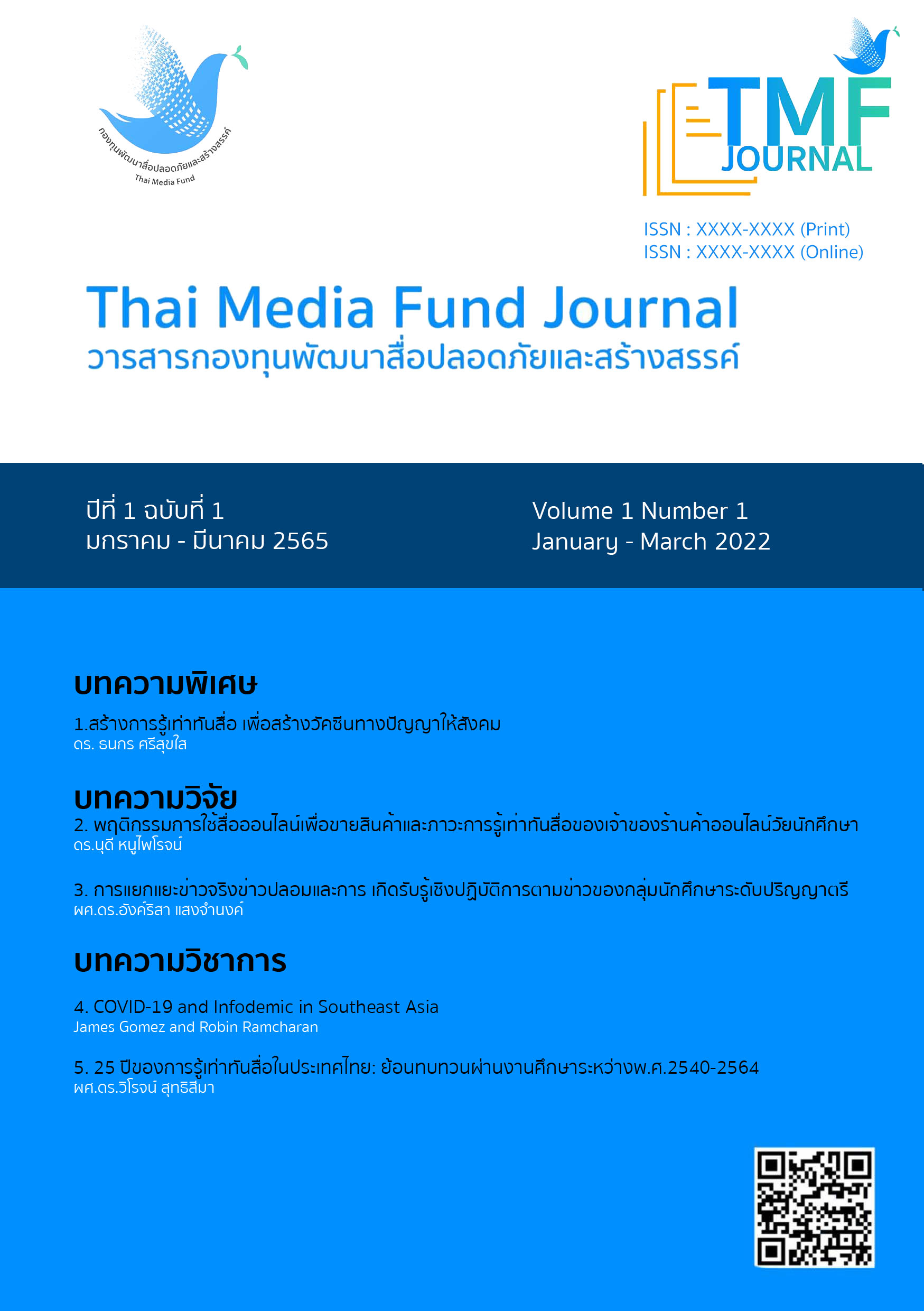สร้างการรู้เท่าทันสื่อ เพื่อสร้างวัคซีนทางปัญญาให้สังคม
Main Article Content
บทคัดย่อ
ทำไมต้องรู้เท่าทันสื่อ
คำว่า “รู้เท่าทันสื่อ” หรือในภาษาอังกฤษคือ Media Literacy ในทางวิชาการนั้นมีการพูดถึงครั้งแรก โดย Elizabeth Thoman ผู้ก่อตั้งสถาบัน Center for Media Literacy และ Media Literacy Archive แห่งมหาวิทยาลัยโรดไอแลนด์ (University of Rhode Island) ในสหรัฐอเมริกา (Bordac, 2014) โดยมีประเทศแคนาดาเป็นประเทศแรกที่บรรจุหลักสูตรการรู้เท่าทันสื่อเป็นส่วนหนึ่งของวิชาในสถานศึกษามาเป็นเวลานาน และมีหลักสูตรการรู้เท่าทันสื่อในระดับต่างๆ รวมถึงหลักสูตรในระดับปริญญาตรี (Tsvietkova.H, Beskorsa.O, Pryimenko.L, 2020) องค์การ UNESCO ก็ให้ความสำคัญกับการศึกษาและการรู้เท่าทันสื่ออย่างมาก (Yenjabok, 2003, p. 111) สำหรับในประเทศไทย แนวคิดการรู้เท่าทันสื่อพัฒนาเกิดขึ้นมาพร้อมๆ กับกระแสการรณรงค์เพื่อ การปฏิรูปสื่อมวลชนในประเทศ โดยในช่วง พ.ศ. 2550 - 2551 ได้มีการจัดตั้งองค์กร และหน่วยงานที่เกี่ยวข้องกับสื่อสาธารณะ เช่น สถานีโทรทัศน์ไอทีวี ซึ่งพัฒนาเป็นองค์การกระจายเสียงและแพร่ภาพสาธารณะแห่งประเทศไทย หรือสถานีโทรทัศน์ไทยพีบีเอสในปัจจุบัน (Siripongtugsin, 2011, p. 71-74) การเกิดขึ้นขององค์กรจัดสรรคลื่นความถี่และกำกับดูแลการประกอบกิจการอย่างคณะกรรมการกำกับกิจการกระจายเสียง กิจการโทรทัศน์ และกิจการโทรคมนาคม (กสทช.) (Tiewsomboon and Khamwichit, 2016, p.97-99) และล่าสุดคือการเกิดขึ้นของกองทุนพัฒนาสื่อปลอดภัยและสร้างสรรค์ ตามพระราชบัญญัติกองทุนพัฒนาสื่อปลอดภัยและสร้างสรรค์ พ.ศ. 2558
Article Details

อนุญาตภายใต้เงื่อนไข Creative Commons Attribution-NonCommercial-NoDerivatives 4.0 International License.
เอกสารอ้างอิง
Bordac,S. Introduction to Media Literacy History. Journal of Media Literacy Education 6(2), 1
Deawkee, T. (2016). Morality and Ethics of Media for Presenting News in Digital Era. Journal of Communication and Management NIDA, 2, 136-140.
Deecharoen, M., & Imsiri, P. (2014). Media Literacy. (Suan Dusit University, Ed.) Office of The National Broadcasting and Telecommunication Commission. Retrieved from http://bcp.nbtc.go.th/uploads/items/attachments/b7bb35b9c6ca2aee2df08cf09d7016c2/_651dab51d77cc9cc0b46de8a418db8e7.pdf
Na Nakorn, P., & Thanaphansin, N. (2017). Using the Theory of the
Role of Media with Press. (P. Chainan, Ed.) Journal of Mass
Communication, 2(5), 150.
National Public Relations Committee. (2020). National Public Relation Policy and Plan No. 5,2020 - 2022. Retrieved from https://energy.go.th/2015/wp-content/uploads/2020/09/national-PR-Plan-63-65.pdf
National Reform Commission on Information Technology Mass Communication. (2021). National Reform Plan., Office of the national Economic and Social Development Council. Retrieved from www.nscr.nesdc.go.th
National Strategy Board. (2018). National Strategy. Office of the National Economic and Social Development Council. Retrieved from https://www.nesdc.go.th/download/document/SAC/NS_PlanOct2018.pdf
NBTC. (2015,). NBTC's History.(G. Administor, Editor, & The National Broadcasting and Telecommunication Commission) Retrieved March 15, 2022, from The National Broadcasting and Telecommunication Commission: https://www.nbtc.go.th/About/history3.aspx
Office of the Royal Society. (2011). Office of the Royal Society Dictionary 2011. Retrieved from https://dictionary.orst.go.th/index.php
Puksuk, P. (2021, December 7). Rwanda: Settling the History of the Genocide, What can We Learn?. Retrieved from https://www.the101.world/lessons-from-the-rwandan-genocide/
Reith, J. (1977). Report of the Committee on the Future of Broadcasting, Cmnd. 6753. London: Her Majesty's Stationery Office.
Siripongtugsin, N., & Tupjumpon, N. (2011). Politics in Public Media Policies of the Thai Public Broadcasting Service. KKU Research Journal (Graduate Studies), 11, 71-74.
Sudsaun, A. (2009). Media Reform under the Constitution of the Kingdom of Thailand 2007. Jullaniti, 6(3), 98. Retrieved from https://www.senate.go.th/assets/portals/93/fileups/ 272/files/S%E0%B9%88ub_Jun/8think/think6.pdf
Tantiwittayapitak, W. (2020, September 23). Hiler's 7 Commandments and Mass War. Retrieved from https://www.the101.world/nazi-propaganda/
Thoman, Elizabeth. (1990/1991). Media Literacy: Agenda for the 90s. Media&Values 52/53,32.
Tiewsomboon, P., & Khamwichit, N. (2016). Media Litercy Level Development of Thais under the Changing Media Landscape. Journal of Public Relations and Advertising Faculty of Communication Arts, Chulalongkorn University, 9, 97-99.
Tsvietkova, H., Beskorsa, O., & Pryimenko, L. (2020). Development of media education in Canada: a brief history. SHS W eb of Conferences 75, 01001 (2020), 2.
UNESCO. (2018). A Global Framework of Reference on Digital Literacy Skills for Indicator 4.4.2. Retrieved from www.uis.unesco.org
Yenjabok, P. (2546). Media Literacy. (ChuenKha,R, Ed.) Humanities
Journals, Faculty of Humanities,Kasetsart University, 11,
Yimprasert, U. (2014). Media Literacy. (Suan Dusit University, Ed.) Office of The National Broadcasting and Telecommunication Commission. Retrieved from http://bcp.nbtc.go.th/uploads/items/attachments/b7bb35b9c6ca2aee2df08cf09d7016c2/_651dab51d77cc9cc0b46de8a418db8e7.pdf


